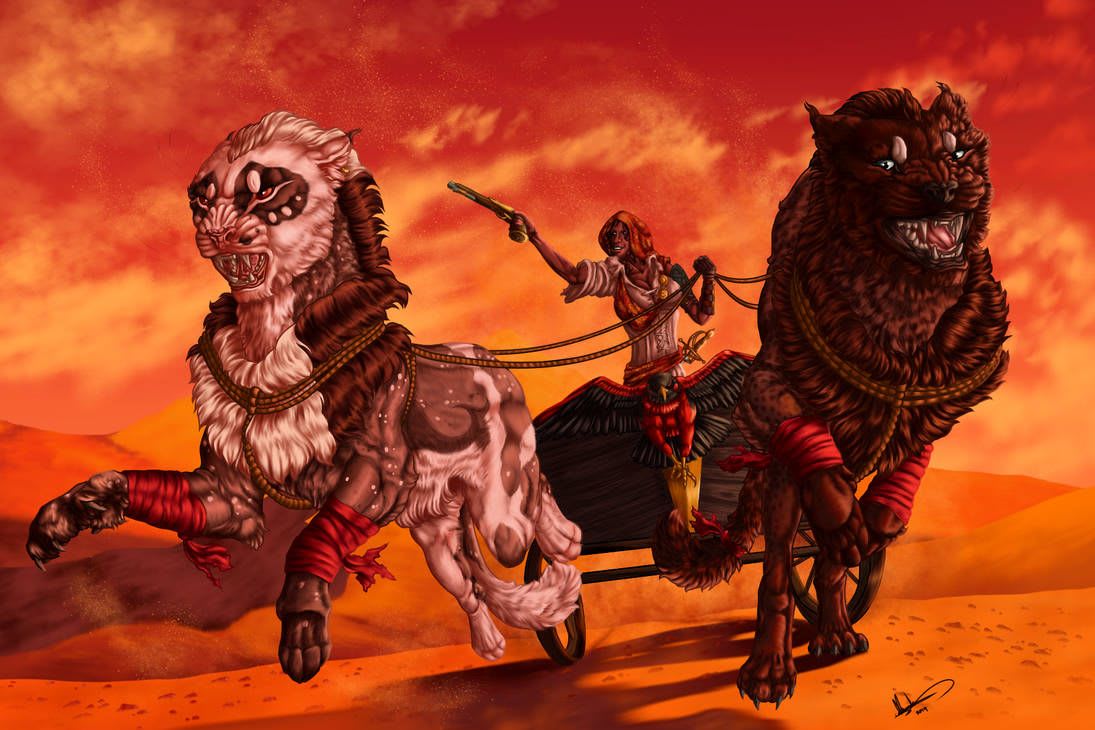Africa is home to many cultures and languages. Although no single set of myths and legends unite this diverse population, different cultural groups and regions share common mythological elements. Similar to other parts of the world, myths in Africa reflect its people’s values and beliefs.
African myths and legends function as a meaningful part of everyday life, often pervading religious beliefs and practices. Some African myths deal with universal themes, such as the origin of the world and the fate of people after death. Many more spring from the continent’s own environments and history.
Before the modern era, Africans south of the Sahara Desert had relatively limited contact with the rest of the world. Sub-Saharan myths and legends developed over thousands of years. Among the influences on their development were the mass movements of people that took place from time to time. For instance, about seven thousand years ago, the ancestors of the Khoisan people, an indigenous African group, began moving from the Sahara towards southern Arica. Five thousand years later, people who spoke Bantu languages began spreading out from Cameroon, on Africa’s west coast, until they eventually inhabited most of sub-Saharan Africa. Such migrations caused myths and legends to spread from group to group and further led to a mixing of cultural beliefs.
The migration also gave rise to new stories about events in history, particularly of these groups. For instance, as Bantu groups settled in new homelands, they developed legends to explain the origins of their leading families and the structure of their societies. African cultural groups did not use written language until modern times. Instead, they possessed rich and complex oral traditions, which they used to pass myths, legends and histories from generation to generation. In some cultures, professional storytellers called griots preserved the oral tradition. Written accounts of African mythology began to appear in the early 1800s, with the arrival of European explorers and colonizers. Present day scholars work to record the continent’s myths and legends before they are lost to time and cultural change.
African mythologies often feature supernatural beings who influence human life. Some of these beings are powerful deities or gods. Others are lesser spirits, such as spirits of ancestors. Most African cultures have multiple gods, often grouped together in family relationships. Nearly every culture recognizes a supreme god, an all-powerful creator, who is usually associated with the sky. Various West African peoples refer to the highest god as Amma, while east Africans use the name Mulungu. Africans who have adopted Christianity or Islam sometimes blend the supreme deity of those faiths with the supreme deity of traditional African religions and mythology by calling them the same name.
Robert Anulgista, a history lecturer from Namibia confirmed this. “In most African religions, the supreme god is a distant being no longer involved in day-to-day human life. People rarely call on this deity. Instead, they address lesser gods, many of whom have distinct functions. The Yoruba people of Nigeria for example, worship a storm god called Sango, who controls thunder and lightning. The number of gods and goddesses varies from culture to culture. The Baganda people of east central Africa have 20 or more deities. Many populations regard the earth, sun and moon as gods.”
Many Africans believe that human spirits exist after death. According to some groups, these spirits live underground in a world much like that of the living – only, it is upside down. The spirits sleep during the day and come out at night. Other groups place the realm of the dead in the sky. The Bushmen of southern Africa say that the dead become stars. Additionally, other African groups believe the spirits of dead ancestors remain near their living descendants to help and protect them, as long as these living relatives perform certain ceremonies and pay their ancestors due respect.
“Owing to the fact that the Zulu tribe of South Africa believe that the spirits of the chieftains and other important people offer protection, they hold special ceremonies to bring them into the community. In some cultures, it is said that the soul of the dead grandfather, father or uncle can be reborn into a new baby. Another common belief is that dead souls, particularly those of men, return as snakes, which many Africans regard with respect,” said Mosipi Haonne, a former chief’s aid in Harare, Zimbabwe.
Ancestor cults or groups play a leading role in mythologies of some people, especially in east and southern Africa. The honored dead, whether members of the immediate family, the larger clan or kinship group, or the entire culture, often become objects of worship and subjects of tales and legends. Many groups trace their origins or the origins of all humans to ancestors first. The Baganda, the people of Buganda in present-day Uganda, say their first ancestor was Kintu, who came from the land of the gods and married Nambi, the daughter of the king of heaven.
Many myths explain how the world came into existence, as recounted by many cultural groups. Although myths of various African cultures have existed primarily in oral form, others were documented and turned into formal reading books that are now referred to for insight by newer as well as older generations.
Leave a Comment
Sign in or become a Africa Rebirth member to join the conversation.
Just enter your email below to get a log in link.


Related News
How Ancient Mombasa Became the Gateway of African Commerce
May 31, 2025
Poro and Sande: The Secret Societies of West Africa
Apr 30, 2025
What can we Learn from Great African Warriors?
Jul 20, 2023